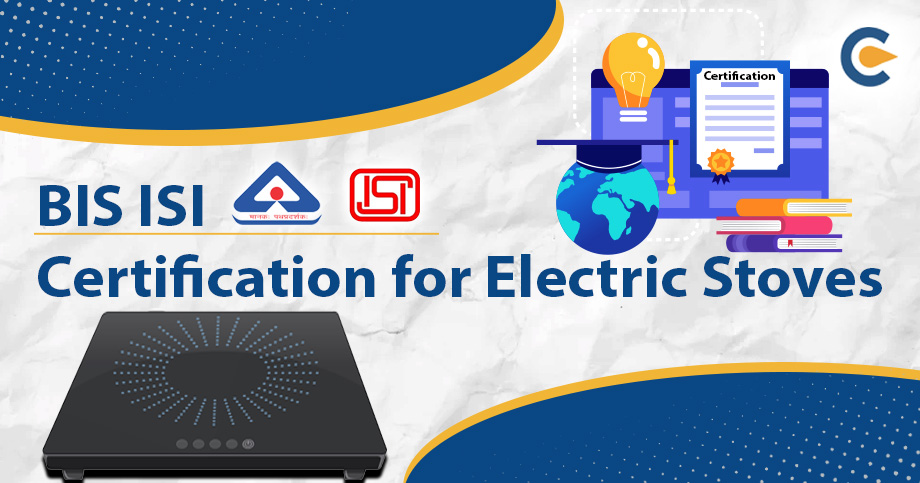An electric stove is a stove with an integrated electric heating device to bake & cook. This device became popular as a replacement for solid-fuel such as wood or coal, stoves which required more labour to operate & maintain. To get BIS Certification in India and produce a standard quality product, the Manufacturer must ensure that their product must follow the specified Indian Standard. The electric stove comes under IS 302 (Part 2/Section 202) and this Standard specifies the general & safety requirements and the test methods for electrically heated stoves with open-type heating elements, specially designed for connection to supplies with voltage not surpassing 250 Volts, ac single phase 50 HZ or dc. IS 302 (Part 2/Section 202) specifies the safety requirements in order to make sure that personal safety from electric shock, protection from extreme fire & heat, and dependable operation. This Standard doesn’t apply to multi-unit electric stoves that have more than one heating unit. So, if any manufacturer wants to manufacture electric stoves in India, then it is necessary to obtain BIS ISI Certification for Electric Stoves because without this, no one can sell or trade this device in the Indian Market.
Benefits of Obtaining BIS ISI Certification for Electric Stoves
Following are some important benefits of obtaining BIS ISI Certification for Electric Stoves:
- Providing Authenticity to the Product: Products that don’t have ISI Certification do not provide credibility or assurance to the customers and, by default, fail to gain the trust of the targeted customers. BIS ISI Certified products always guarantee Authenticity & uniqueness in every possible aspect as they market their product to be of high quality and this is one of the main benefits of buying an ISI-certified product because these products are reliable & credible and increase the reputation of their brand among customers.
- Ensures High-Quality Standards: The Bureau of Indian Standards adopts the general approach for the implementation of quality compliance for all manufacturers. Companies under BIS Registration are bound to follow a certain standard for manufacturing products. The manufacturing premise where the production is usually carried out is examined by the BIS Investigation Officers through sudden visits. It enables the Bureau of Indian Standards to continually monitor the production facilities for product quality & given compliance.
- Provides Competitive Advantage: BIS ISI Certification shows the standard quality of the product, which provides the Manufacturer with a competitive edge because a customer always prefers a certified product.
- Minimises Environmental Risk: The Bureau of Indian Standards has prohibited the use of certain chemicals & materials under its prescribed norms. Therefore, it plays an essential role in standardising the quality of products for safety & the environment associated with the industrial sector.
Various Tests Required for BIS ISI Certification for Electric Stoves
Tests are classified into three categories:
- Type Tests: The type tests shall be carried out on 2 samples of electric stoves of the same type & rating selected preferably at random from a regular production lot. Before the commencement of the tests, the electric stoves shall be visually examined & inspected for obvious visual defects concerning components parts & their assembly construction, marking, stability provision of suitable terminals for supply connection, earthing & the effectiveness of screws & connections. The external surface finish shall be even & free from finishing defects.
- Criteria for Acceptance: Bothe samples shall pass all the type tests for proving conformity with the standards’ requirements. If any of the samples fails in any of the type tests, then the Testing Authority, as its discretion, may call for fresh samples not exceeding twice the actual number & subject them again to all tests or to the test(s) in which failure occurred, no failure shall be permitted in the repeat test(s).
- Protection against electric shock;
- Input;
- Temperature-rise;
- Insulation resistance & electric strength at operating temperature;
- Moisture Resistance;
- Insulation resistance & electric strength (after humidity);
- Thermal Efficiency;
- Earthing Connection.
- Routine Tests: The following tests constitute the Routine Tests:
- High voltage;
- Protection against electric shock;
- Earthing connection.
Marking on the Product
Marking on a product shall be done as per IS 302 (Part-2/Sec 202). The ISI Mark may also be applied to the product. Under the Product Certification Scheme, the BIS grants BIS Certificates to use the ISI Mark on products. The Certificate can only be issued to the Manufacturer if the product meets the requirements of Indian Standards. The Manufacturer must get a BIS ISI Certification for Electric Stoves from the BIS to use ISI Mark. The Bureau of Indian Standards will issue a License after successfully assessing manufacturing processes, infrastructure, testing capabilities & quality control during a visit to manufacturing premises.
Documents Required for BIS ISI Certification for Electric Stoves
Following are some crucial documents required for BIS ISI Certification for Electric Stoves:
- Identity proof of the Manufacturer;
- Address proof of the Manufacturing premise;
- Copy of the Trademark Registration Certificate;
- Copy of the Certificate of Incorporation;
- Factory layout plan;
- Details of equipment used for testing;
- Drawing of the product;
- Packaging details such as quantity, product size, storage facility, etc.;
- Flow chart of the manufacturing process;
- Copy of the Company’s Bank Statement;
- Particulars regarding the raw material being used;
- Proof of Indian Residency;
- Latest utility bills (not more than 2 or 3 months) such as electricity bill, gas bill, water bill, etc.;
- A certified-copy of the test report by a BIS-recognised lab.
Procedure for BIS ISI Certification for Electric Stoves
Following is the general procedure for BIS ISI Certification for Electric Stoves:
- Selecting the Product Code: The Manufacturer needs to identify first and choose the ISI Standard Product Code for their product.
- Filing BIS ISI Application: After the above step, then the Manufacturer needs to fill out the application form online and pay the Registration fee and audit fee for further inspection.
- Inspection of the Factory Premise/Unit: Once the applicant file the form correctly, then the BIS Officials will visit the premise of the Manufacturer & examine the complete manufacturing process & quality control. The BIS Officer will collect some products’ samples & send them for testing in a BIS-recognised lab.
- Submission of Test Report: It is essential to submit the product sample report from the certified labs and submit it to the BIS.
- Issue of BIS ISI Certificate: Once the application & inspection process is completed, the BIS issues BIS ISI Certification for Electric Stoves[1].
Conclusion
As mandated by Law, it is essential to get BIS ISI Certification for Electric Stoves as it not only ensures quality & safety standards but is also required if a Manufacturer of an Electric Stove wants to export, sell & import in India.
Read Our Article: BIS ISI Certification for Ordinary Portland Cement













